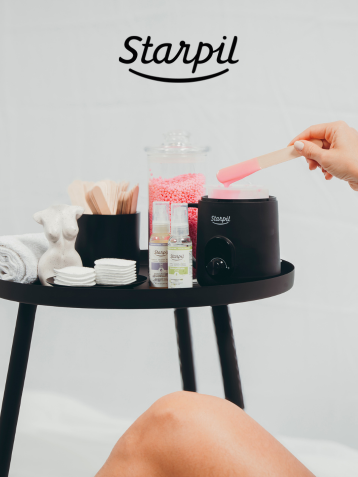Waxing in the Winter: Everything You Need to Know

It’s no secret that a lot of clients tend to skip or reduce their regular waxing schedule during the winter months. After all, what’s the point when you’re bundled up? However, waxing during the winter is integral to keeping your hair growth cycle on track and your skin healthy.
Table of Contents
Waxing in winter brings huge benefits for those who wax regularly throughout the year and those just starting on their waxing journey. Keep reading for all of our top tips to wax in winter—the right way!
READ: How Often Should You Get Waxed? Timing Tips
Why Bother Waxing In The Winter?
If you’re thinking of taking a break from waxing during the winter months, consider the following if you impact on your hair growth cycles and future results:
- Winter parties: Wearing shorter dresses at holiday parties might cause you to feel a little insecure if you have more hair on your legs than you’re used to. Though it’s never wrong to have some hair on your legs, keeping up with your usual routine might make you a little more comfortable.
- Vacation: Waxing is always an essential for a tropical getaway during the snowy season, or just to be your most confident when jumping in the hot tub.
- Facial waxing: Your facial grooming routine should be the same in winter as in summer. No one wants an out-of-control mustache, regardless of the season!
Now that you're convinced to keep up your regular waxing routine, what about those curious about starting their waxing routine in the winter? Let’s investigate when to start a waxing routine so you’re always looking your best.
READ: How Long Does Waxing Last?
How to Start A Waxing Routine in Winter
If you're new to waxing, winter is a great time to start. The first few months of your waxing regimen can be a little awkward or uncomfortable as you’re getting into the swing of things, so the colder months are a great time to kick things off.
- Ease yourself in: Waxing can be a little more painful or uncomfortable when just starting out. After those initial few appointments (remember, your waxing services can be spread anywhere from 4-6 weeks), you'll be on track.
- Skin irritation: In the beginning, your body may react to waxing in different ways. You might experience inflammation or irritation in your freshly waxed areas after your first few appointments.
- Keep up your routine: Allowing your body time to adjust and heal up will ensure much more flawless results as you continue on your waxing journey. The more often you wax, your body will learn how to respond better and better.
- Pre & post-wax care: Practicing the right pre and post-wax care will also ensure that your body will adapt and your results will become increasingly flawless over time.
READ: When to Exfoliate After Waxing
How Winter Waxing Helps Hair Growth Cycles
Waxing in the winter can also help keep your hair growth cycles consistent with one another.
There are four phases of hair growth: anagen, catagen, telogen, and exogen:
- Anagen phase: During the anagen phase of the hair cycle, hair is actively growing. This is when you want to wax! This hair growth cycle can last 4-6 weeks for body hair.
- Catagen phase: The catagen phase lasts for just 10-14 days
- Telogen phase: This phase lasts 50-100 days before the cycle resets again, with the anagen phase starting over.
- Exogen phase: Hair has the potential to grow for years before it even reaches this last exogenous phase.
When you first begin waxing, you might notice that your results don’t always last as long as you’d expect. This is because each hair follicle can be in a different phase in these hair growth cycles.
Waxing in regular intervals will allow you to remove each hair while it is in the anagen growth phase so eventually, all of your hair will be on a similar, consistent hair growth pattern. Hence the more often you wax, the more flawless and long-lasting results you will get!
READ: When Does Armpit Hair Grow? Hair Growth for Underarm Waxing
When is the Best Time to Wax?
The best time to wax regularly is every 4-6 weeks continuously throughout the year—even in winter! Starting for the first time during the colder months is also ideal.
If you're new to waxing, you may find yourself not as comfortable with a particular salon and find that the wax they use has an adverse effect on your skin. If you’ve had this experience, don't give up on waxing quite yet! Finding the right wax for your skin or hair type might take a couple of tries at first.
Starting in the winter months will give you plenty of time to get used to the wax formula, salon or esthetician you choose.
READ: Waxing vs. Shaving: What is the Best Method for Hair Removal?
Which Wax is Best in Winter?
Starpil offers a wide variety of wax formulas for all skin and hair types. Many of these formulas not only provide amazing results for any waxing need but also contain specialty ingredients to nourish even the driest or most sensitive winter skin.
Coral Film Hard Wax
Our Coral Wax is a top choice for the winter months because of its detoxifying and skin brightening properties. It brings huge skin benefits for those experiencing patchiness during the winter months and provides highly-effective hair removal results.
This skin-enhancing formula reduces redness and irritation, which makes it ideal for those just beginning their wax journey. It also promotes skin cell regeneration for glowing, even skin post-wax.
Starsoft Hard Wax
Starsoft Hard Wax is made specifically for people with hypersensitivity, dry or aged skin and is the only hard wax formula with neurosensory properties on the market. This hypoallergenic hard wax dulls pain, redness and inflammation, and removes hair effortlessly without irritating sensitive skin.
Calendula Hard Wax
Our sanitizing and moisturizing Calendula Hard Wax creates a barrier between skin and bacteria to keep it clear of breakouts and ingrowns. This makes it ideal for oily or reactive skin, or sensitive winter skin.
It also works to soothe and hydrate skin, which is ideal for those just starting their waxing journey.
READ: Waxing at Home: The Complete Beginner’s Guide
Final Thoughts
Hair removal isn't left just for one particular season. Even in what some people consider "off" months (aka winter!) waxing is just as important!
Continuing your regular waxing sessions throughout the winter is vital to keeping those flawless results you are already achieving. Plus, if you’re just starting out, winter gives you the perfect opportunity to get your hair growth cycles on track and will give your skin time to adapt and get used to the waxing process.
With Starpil’s hard waxes, you’ll have not just hairless, clear skin, but the radiance and confidence to take on anything winter brings.


































Comments